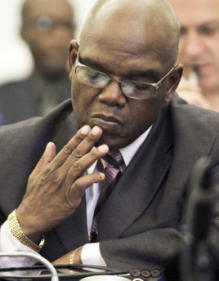|
Getting your Trinity Audio player ready...
|
 Dear Corruption Watch
Dear Corruption Watch
It seems the Supreme Court of Appeal has found that the decision to withdraw corruption charges against Richard Mdluli, former head of police crime intelligence, was not sound. Am I correct that it has ordered the National Prosecuting Authority to re-examine its decision? What will this entail? And can the NPA go through the motions of reconsidering the decision and still decide not to pursue charges?
Concerned about our police
Dear Concerned,
You are not quite correct that the Supreme Court of Appeal has ordered the NPA to re-examine its decision to withdraw the charges against Mdluli. The decision has rather been reviewed and set aside. This means that the court has effectively withdrawn the withdrawal decision as though it had never been taken. So the corruption charges that were withdrawn have now been reinstated.
As the court said in its judgment, “the setting aside of the withdrawal of the criminal charges and the disciplinary proceedings have the effect that the charges and the proceedings are automatically reinstated and it is for the executive authorities to deal with them”. It is now up to the NPA to treat the corruption charges just as it would any other criminal charge.
However, as you point out in your question, what is to stop the NPA from acting in bad faith? If the NPA is set on not pursuing the charges against Mdluli, could it not simply ignore the charges or, worse, make a new decision just to drop the charges?
The answer to these questions is complicated. An important part of the doctrine of separation of powers is that the courts should not make the decisions about who should be prosecuted and then also sit as judges over those individuals. For this reason, the constitution and parliament task the NPA with the job of initiating, pursuing and, in certain cases, dropping criminal charges.
The NPA must perform these functions without fear, favour or prejudice. If courts took the position that they could simply interfere whenever they felt the NPA should initiate criminal charges or drop them, its independence would effectively be destroyed.
In its judgment, the court struck a balance between respecting that independence while recognising that the NPA might, in exceptional circumstances, fail to live up to the standards of the constitution and the National Prosecuting Authority Act. It applied what is sometimes called the principle of legality to decide whether the NPA had acted lawfully, rationally and in accordance with the empowering statute.
This doctrine reflects a relatively high level of deference to the organ of state that is being reviewed. Under the doctrine, a court will not ask whether or not the decision by the NPA was reasonable. It will ask whether the decision was rational or failed to comply with the duties imposed by the act and constitution.
When the NPA is deciding what to do with the reinstated charges against Mdluli, it will have to comply with the principle of legality. If it does not, the courts may again intervene to correct poor decision-making.
In fact, the high court in the Mdluli case ordered the national director of public prosecutions to ensure that all prosecutions against Mdluli were enrolled and pursued without delay. The Supreme Court of Appeal set that order aside. However, the court noted that, on rare occasions and for compelling reasons, a court may be willing to intervene more actively.
If the NPA again drops the ball in its prosecution of Mdluli, a court may be convinced to intervene and ensure a proper prosecution.
• This article was first published in Sunday Times: Business Times


